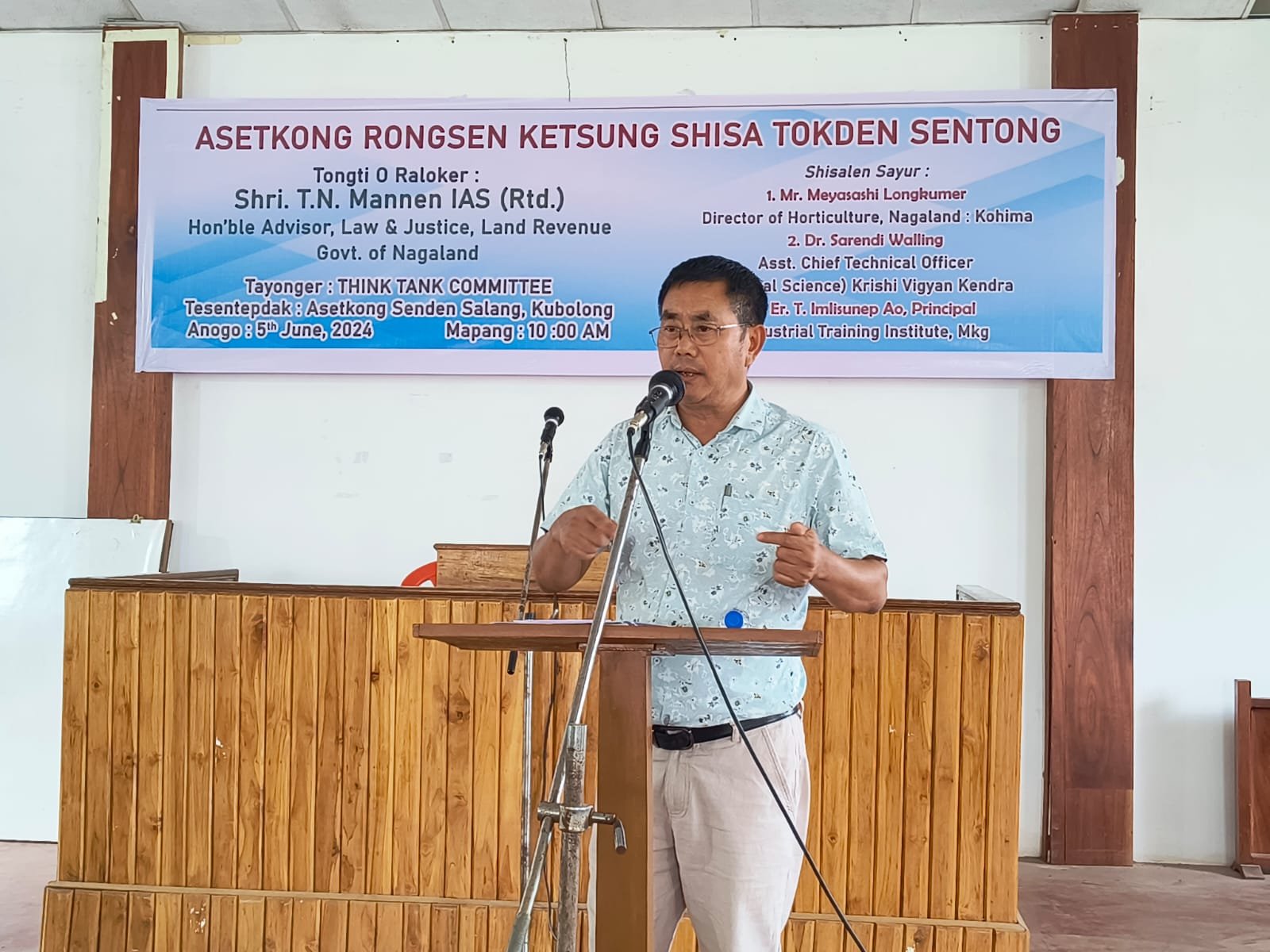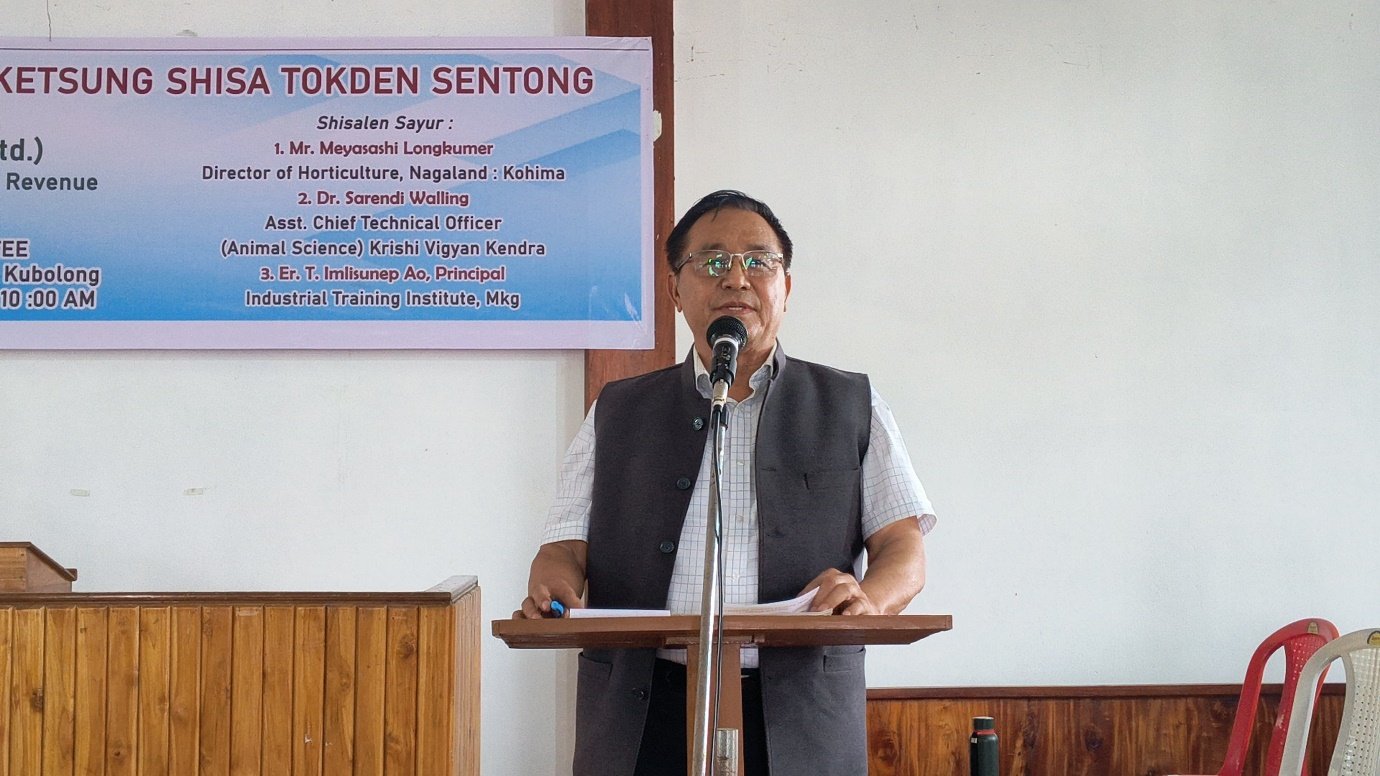The Asetkong Socio-Economic Seminar (Asetkong Rongsen Ketsung Shisa Tokden) was held at Asetkong Senden Salang, Kobulong sub-division of Mokokchung district, organized by the Think Tank Committee on 5 June 2024.
Delivering the keynote address, TN Mannen, IAS (Rtd), Advisor of Law & Justice and Land Revenue, acknowledged the Think Tank Committee for organizing the seminar. He explained that “Development is a process of change with growth in both social and economic spheres” and emphasized that the strength of the nation depends on the economy and development work.
The Advisor remarked on Asetkong’s prolonged entanglement in inter-village political conflicts, attributing them to a significant setback in the range’s development and growth across various dimensions. He characterized development as a dynamic process involving both social and economic advancement, underscoring the establishment of the Think Tank Committee to explore innovative ideas and conduct research aimed at enhancing Asetkong’s economic outlook.
TN Mannen acknowledged that Asetkong is one of the smallest ranges among the six in Mokokchung district but highlighted its potential. “People knew the capability of Asetkong, but we never realized it ourselves. Even if we cannot catch up with others now, I hope that our youth and future generations will participate in uplifting,” he said. He emphasized that development should not be based on party politics, encouraging prioritization of Asetkong’s development and unity among the people. “Let’s all work on social and economic spheres together for a better tomorrow,” he urged.

Discussing both the positive and negative aspects of Asetkong, TN Mannen highlighted the region’s rich resources, fertile soil, and small streams, while noting the lack of knowledge on effective utilization and the low number of young farmers. Citing local products like Mopungchuket biscuits and Anishi from Sungratsu village, he emphasized their commercial potential and the possibility of boosting tourism and creating employment. He also mentioned the significance of Sichuan leaves from Longjang Village.
The former bureaucrat emphasized the importance of cooperative business and utilizing the agri-based economic environment of each village to amplify economic growth. He urged the community to take advantage of numerous schemes under the agri and allied sectors while cautioning against a subsidy-dependent mindset.
He stressed the societal strength derived from development and unity, saying, “If we unite together, we can catch up with others and achieve self-sufficiency, becoming an example to the world.” Mannen appealed to the community to avoid deforestation, which affects ecological balance and water sources.
The Advisor criticized the over-reliance on government jobs in Nagaland, with 60 to 70 percent of state revenue going to salaries, thus neglecting development. He pointed out the “Naga mentality” of spending rather than growing money, highlighting issues with loan repayment and banking trust. Challenging the focus on government jobs, he advocated for generating policies on a cooperative basis. Targeting the youth, he encouraged discussions on creating employment opportunities and generating jobs for young people.
Concluding with a reference to John F. Kennedy, Mannen inspired the audience with the quote, “Ask not what your country can do for you—ask what you can do for your country,” urging reflection and action for the betterment of Asetkong.
Download Nagaland Tribune app on Google Play

President of Asetkong Mungdang, S. Pangyang Ozükum, in his address, emphasized the importance of quality over quantity and financial expenditure. “Quality is in demand,” he stated, urging people to emulate successful practices and avoid laziness. He highlighted the value in production and manufacturing, noting that the modern world is driven by marketing and consumerism. “There is no loss in making things. Finance is within us; make proper use of it,” Ozükum encouraged.

T. Imlitoshi Walling from the Think Tank Committee explained the purpose of the Think Tank Group initiated by TN Mannen, IAS (Retd.) Advisor, Law & Justice and Land Revenue to promote economic development in the Asetkong Range. Walling pointed out that while the region has abundant resources, there are challenges that need addressing to achieve progress. He emphasized the necessity for practical, proper studies in each village to enhance Socio Economic development.
“The world is growing, but we are not changing,” Walling remarked, acknowledging the difficulty of doing good deeds despite their apparent simplicity. He also criticized the spread of unnecessary and discouraging news, urging a primary focus on improving economic conditions through collective ideas and efforts.

The program featured resource persons including Meysashi Longkumer, Director of Horticulture Nagaland, Kohima; Dr. Sarendi Walling, Assistant Chief Technical Officer (Animal Science) at Krishi Vigyan Kendra, Mokokchung; Er. Imlisunep Ao, Principal of Industrial Training Institute, Mokokchung; and Dr. Bendangienla Aier, Lecturer at Bharati Vidyapeeth, Pune, and Director of Inquisitor Consultant, Odisha, alongside Senkalemba DHO Phek. These experts presented various economic developmental aspects and focus areas, encouraging Asetkong citizens with their research data, schemes, and income-generating ideas.
During the discussion hour, participants addressed three main agenda items. Firstly, they proposed opening an Asetkong market and building a storeroom for farm products. Secondly, they discussed further developing the infrastructure of Kubolong Primary High School. Lastly, village councils agreed to identify the needs of farmers in each village and submit these needs to the Think Tank Committee for implementation.

